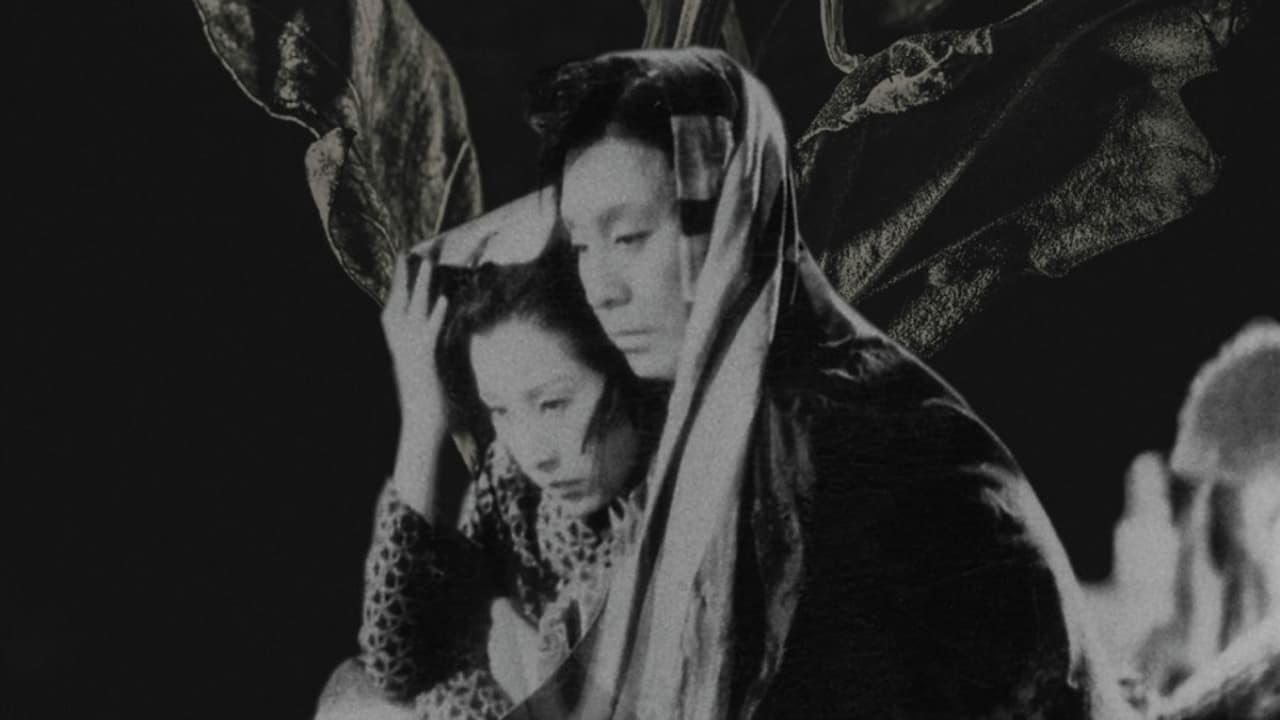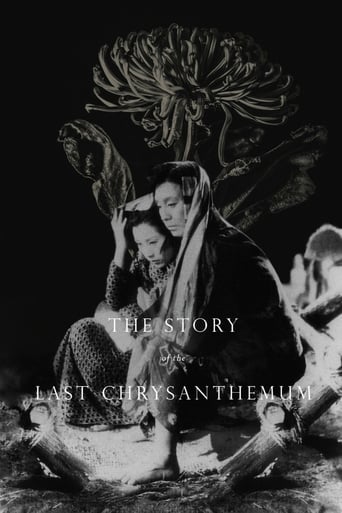

Watch something else. There are very few redeeming qualities to this film.
... View MoreThis is a coming of age storyline that you've seen in one form or another for decades. It takes a truly unique voice to make yet another one worth watching.
... View MoreThe plot isn't so bad, but the pace of storytelling is too slow which makes people bored. Certain moments are so obvious and unnecessary for the main plot. I would've fast-forwarded those moments if it was an online streaming. The ending looks like implying a sequel, not sure if this movie will get one
... View MoreGreat example of an old-fashioned, pure-at-heart escapist event movie that doesn't pretend to be anything that it's not and has boat loads of fun being its own ludicrous self.
... View MoreFirst, this is a tragic, tear-jerking love story, less complex than some other Mizoguchi films, but I can't believe it won't tear your heart out a little. I'm fairly ignorant of Japanese cultural history, but the film convincingly plays out the social structure of Kabuki theater troupes, with prominence dependent on a family name, back-biting hangers-on, a harsh distant ruling father, and a bevy of servants. Mostly masterfully staged; the Kabuki sequences with distant long takes add poignancy and irony to the 'real-life' drama of the actor and his ill-matched lover. I disagree with other reviewers who found the lead actress cloying; I interpreted Otoku's devotion as a carryover from traditional Japanese class structure, and she coughed pretty rarely until the last part of the film. Actually, for 'realism' she should've been coughing more.Tuxedos and bowlers sometimes are sported, but otherwise Western influences over life within the plot seem pretty rare. OTOH, the whole film seems to exhibit the influence of the Western romantic tradition--I don't know how much Japanese tradition is parallel to that. The main plot-line does have some surprising and/or unfortunate elements (SPOILERS): the way Kiku finds Otoku, the way Kiku gets convinced to return home, his lack of effort to find her in Tokyo, his father's final acceptance, Otoku's death without Kiku being there to weep--surely he knew she would die while he was away.That being said, the videotape I viewed was faded, faces were indistinct, scenes may have been deleted, and the subtitles were extremely bad. It's actually lucky the plot was simple and fairly predictable, or the lack of subtitles for many stretches of conversation, or their obvious inaccuracy, would have spoiled the film--they surprisingly did not. Yes, it's predictable, but so is Shakespeare or Tokyo Story, and frankly, the degree of predictability is culturally interesting.
... View MoreFrom director Kenji Mizoguchi (Sansho the Bailiff), this Japanese film was featured in the book of 1001 Movies You Must See Before You Die, obviously I had not read anything about prior to watching it, but that didn't matter, I was watching whatever. Basically, set in Tokyo in 1888, Kikunosuke Onoue (Shôtarô Hanayagi) is the adoptive son of an important famous Kabuki actor, he is the heir to his father, and that he finds out is the only reason he is praised as an actor himself. Behind his back the acting troupe complain about how bad he is, and the only person to be honest and talk to him about it is wet-nurse Otoku (Kakuko Mori), but she the family fire her. Kikunosuke is forbidden from seeing her because the family want to avoid the gossip that would be caused about one of them having a relationship with a servant. He has fallen in love with Otoku however, so he leaves home to be with her and try to find a better living as an actor outside of Tokyo, and also to try and gain respect back from his family. Also starring Gonjurô Kawarazaki as Kikugoro Onoue V, Kôkichi Takada as Fukusuke Nakamura, Ryôtarô Kawanami as Eiju Dayu, Nobuko Fushimi as Onaka, geisha, Benkei Shiganoya as Genshun Amma, Yôko Umemura as Osata, Kikugoro's wife, Tamitaro Onoue as Tamizo Onoue, Kisho Hanayagi as Tamisaburo Onoue and Tokusaburo Arashi as Shikan Nakamura. The acting is fine, the costumes and sets are good, and the long takes are interesting most of the time, I will be honest and say that some of the story was a little difficult to follow and keep up with, but I can see that this does represent well the insight into the roles of women in Japanese society, overall I agree it is a worthwhile period melodrama. Very good!
... View MoreThis is one real powerful and effectively directed movie, that also is fine looking and features some fine acting performances.It's a quite long movie, which is not really due to its story but more in the way its sequences are handled. Director Kenji Mizoguchi maintains a very slow pace with many long static scenes in it, in which the camera doesn't move and there are no in between cuts. It does work out well though for the movie. It makes the movie visually beautiful to look at but also makes the story more powerful. It's a real fine directed movie, for which the director can not be praised enough. He handles the movie and its story really well and effectively.The story features some typical and important Japanese themes in it, such as honor and family. Fans of Japanese cinema or Japanese culture will surely get a blast out of this movie. The entire story is set in the Japan, or Tokyo to be precise, of 1885. This means that the movie is also being filled by some wonderful looking sets and costumes.It's also a pretty well acted movie. Normally I'm not a too big fan of acting in Asian movies but this movie feature some rather realistic performance, that don't ever go over-the-top, which also is a real accomplishment for a '30's movie in general.Mostly due to its directing approach the movie works out so well and effectively. Because lets be honest, the story itself is actually quite simple and also not something that hasn't done before in any way. It's the reason why director Kenji Mizoguchi is still so loved and appreciated by many, even now, well over 50 years after his death. The themes are all handled well and despite being not too original, it all works out still well and refreshing.But it's not just a style for everybody though. I can understand that some people might not like watching this movie, since it's pace is so slow and overall cinematic style is so outdated now days. Nevertheless cinematic lovers, or just fans of Japanese cinema, should be able to really appreciate this movie.9/10http://bobafett1138.blogspot.com/
... View MoreNo, The Story of Late Chrysanthemums is not a bad movie, not at all. In fact, it is quite good. However, it is hardly perfect. This is an Alcestis-like story about a wife, Otoku (Kakuko Mori), who sacrifices herself for the sake of her husband. The man is a young actor, Kikunosuke (Shotaro Hanayagi), who is living in the shadow of his famous father. The name earns him respect and praise, but only when he is present. When his back is turned, nobody hides the fact that they think he's terrible, and he knows it. Otoku, the wetnurse of his brother, is the first to give him honest criticism. The two fall in love and attempt to marry, but Kikunosuke's father and the rest of his family won't allow him, a man of noble birth, to retain the name if he should go through with it. He does it anyway, and spends many long years suffering as a nobody. Meanwhile, Otoku works at keeping things going; she even begs acting troupes to give her husband a job. Kikunosuke doesn't appreciate her enough, but, then again, she is selfless to a fault. She becomes downright annoying as the picture progresses: always whining, and, after every major bit of dialogue, she has a coughing fit. Let me ask those who overpraise this movie: did anyone not see the ending coming from the first ten minutes? Mizoguchi made many films that were similar in theme, but not nearly as irksome, and his actors were nearly always better. Still, the man's cinema is evolving rapidly, and his direction is downright beautiful. The cinematography flows like poetry. I like it more than I let on above, but I really do want to urge my fellow internet critics to hold the same standards to Kenji Mizoguchi that you would to any other director. 8/10.
... View More